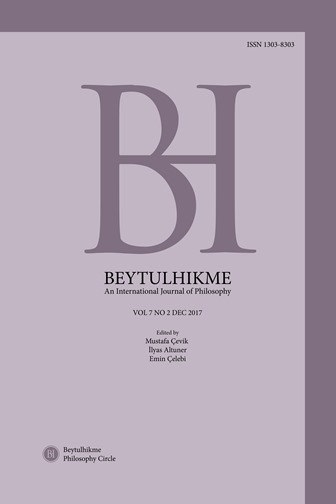Author :
Abstract
Bahtin Rabelais ve Dünyası adlı çalışmasında, Karnavalesk ve grotesk edimlerle beliren “itibarsızlaştırma” geleneğinin Ortaçağ halk kültüründe önemli bir yeri olduğunu iddia eder. Politik, sosyal ve kültürel verilerden yola çıkarak felsefede “itibarsızlaştırma” kavramını ortaya atan Bahtin, bu kavrama estetik veya sanat felsefesi perspektifinden yaklaşmaz. Bu çalışmanın amacı, Bahtin’in “Rabelais ve Dünyası” adlı eserinde ortaya koyduğu “itibarsızlaştırma” kavramının ilkelerini araştırmak, sanatla bağını kurmaktır. Bununla birlikte sanatın işlevlerinden biri olarak, Bahtin’ in bu kavrama atfettiği anlamı merkeze alarak, Immanuel Kant’ın ve Arthur Danto’nun estetik ve sanat anlayışlarıyla “itibarsızlaştırma” arasında ilişkiler kurmak çalışmanın amaçları arasındadır.
Keywords
Abstract
In his work “Rabelais and His World”, Bakhtin argues that the tradition of “degradation”, presented in carnivalesque and grotesque aspects, has an important place in the medieval folk culture. Introducing the concept of “degradation” in philosophy from political, social and cultural data, Bakhtin himself does not approach this concept from the perspective of aesthetics or philosophy of art. The aim of this study is to investigate the principles of the concept of "degradation" put forth by Bakhtin in his work "Rabelais and His World" and to establish a bond with art. However, based on the meaning attributed to this concept by Bakhtin as one of the functions of art, one of the aims of this study is to establish relations between degradation and Immanuel Kant and Arthur Danto's senses of aesthetics and art.
Keywords
- Altuğ, T. (2007). Kant Estetiği. İstanbul: Payel Yayınları.
- Altuğ, T. (2007). Kant Estetiği. İstanbul: Payel Yayınları.
- Bahtin, M. (2005). Rabelais ve Dünyas. (çev. Ç. Öztek). İstanbul: Ayrıntı Yayınları.Burke, P. (1996). Yeniçağ Başında Avrupa Halk Kültürü (çev. G. Aksan). Ankara:İmge Kitabevi.
- Brandist, G. (2011). Bahtin ve Çevresi (çev. C. Soydemir). Ankara: Doğu Batı Yayın- ları.
- Brandt, J. R. & Iddeng, J. W. (ed.) (2012). Greek and Roman Festivals. London: Oxford University Press.
- Danto, A. (2014). Sanatın Sonundan Sonra (çev. Z. Demirsu). İstanbul: Ayrıntı Yayınları.
- Danto, A. (2015). Sanat Nedir (çev. Z. Baransel). İstanbul: Sel Yayıncılık.
- Ferry, L. (2012). Homo Esteticus (çev. D. Çetinkasap). İstanbul: Pinhan Yayınları. Hünler, H. (2011). Estetik’in Kısa Tarihi. Ankara: Doğu Batı Yayınları.
- Kant, I. (2010). Arı Usun Eleştirisi (çev. A. Yardımlı). İstanbul: İdea Yayınevi.
- Kant, I. (2011). Yargı Yetisinin Eleştirisi (çev. A. Yardımlı). İstanbul: İdea Yayınevi.Rabelais, F. (2015). Gargantua (çev. S. Eyüboğlu & A. Erat & V. Günyol). İstanbul: İş Bankası Kültür Yayınları.





